| |||||
| Centuries: | |||||
|---|---|---|---|---|---|
| Decades: | |||||
| See also: | Other events of 2024 Years in North Korea Timeline of Korean history 2024 in South Korea | ||||
The following is a list of events from the year 2024 in North Korea .
| |||||
| Centuries: | |||||
|---|---|---|---|---|---|
| Decades: | |||||
| See also: | Other events of 2024 Years in North Korea Timeline of Korean history 2024 in South Korea | ||||
The following is a list of events from the year 2024 in North Korea .
| Photo | Position | Name |
|---|---|---|
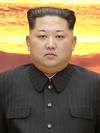 | General Secretary of the Workers' Party of Korea | Kim Jong Un |
 | Chairman of the Standing Committee of the Supreme People's Assembly | Choe Ryong-hae |
 | Premier of North Korea | Kim Tok-hun |
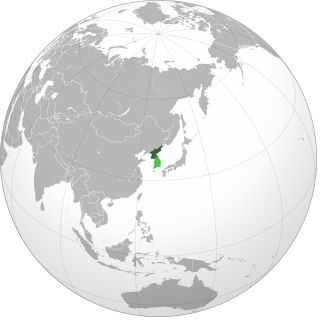
North Korea has a military nuclear weapons program and, as of 2024, is estimated to have an arsenal of approximately 50 nuclear weapons and sufficient production of fissile material for six to seven nuclear weapons per year. North Korea has also stockpiled a significant quantity of chemical and biological weapons. In 2003, North Korea withdrew from the Treaty on the Non-Proliferation of Nuclear Weapons (NPT). Since 2006, the country has conducted six nuclear tests at increasing levels of expertise, prompting the imposition of sanctions.

The Korean conflict is an ongoing conflict based on the division of Korea between North Korea and South Korea, both of which claim to be the sole legitimate government of all of Korea. During the Cold War, North Korea was backed by the Soviet Union, China, and other allies, while South Korea was backed by the United States, United Kingdom, and other Western allies.
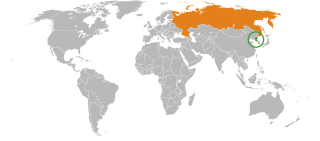
North Korea–Russia relations are the bilateral relations between Russia and North Korea. The Soviet Union was the first to recognize North Korea on October 12, 1948, shortly after the proclamation, as the sole legitimate authority in all of Korea. The Soviet Union supported North Korea during the Korean War. North Korea was founded as part of the Communist bloc, and received major Soviet military and political support. The comprehensive personality cult around North Korea's ruling family was heavily influenced by Stalinism. China and the Soviet Union competed for influence in North Korea during the Sino-Soviet split in the 1960s, as North Korea tried to maintain good relations with both countries.

The Korean People's Army Strategic Force, previously known as the Korean People's Army Strategic Rocket Force, is a military branch of the Korean People's Army (KPA) founded in 2012 that operates surface-to-surface missiles in the nuclear and conventional strike roles. It is mainly armed with ballistic missiles. The inventory includes domestic and Soviet designs.
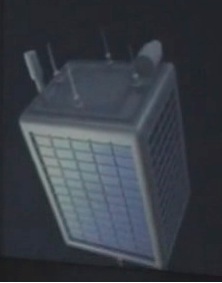
Kwangmyŏngsŏng-2 was a satellite launched by North Korea on April 5, 2009.

The 2009 North Korean nuclear test was the underground detonation of a nuclear device conducted on Monday, 25 May 2009 by the Democratic People's Republic of Korea. This was its second nuclear test, the first test having taken place in October 2006. Following the nuclear test, Pyongyang also conducted several missile tests. A scientific paper later estimated the yield as 2.35 kilotons.
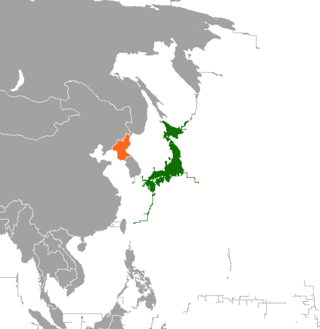
Japan–North Korea relations refers to international relations between Japan and North Korea. Relations between Japan and North Korea have never been formally established, but there have been diplomatic talks between the two governments to discuss the issue of kidnapped Japanese citizens and North Korea's nuclear program. Relations between the two countries are severely strained and marked by tension and hostility. According to a 2014 BBC World Service poll, 91% of Japanese people view North Korea's influence negatively, with just 1% expressing a positive view; the most negative perception of North Korea in the world.
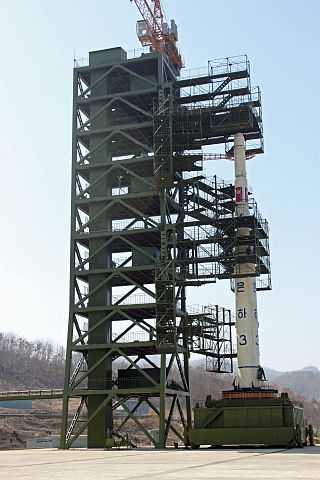
Kwangmyŏngsŏng-3 was a North Korean Earth observation satellite which, according to the DPRK, was for weather forecast purposes, and whose launch was widely portrayed in the West to be a veiled ballistic missile test. The satellite was launched on 13 April 2012 at 07:39 KST aboard the Unha-3 carrier rocket from Sohae Satellite Launching Station. The rocket exploded 90 seconds after launch near the end of the firing of the first stage of the rocket. The launch was planned to mark the centenary of the birth of Kim Il Sung, the founder of the republic. On 1 December 2012 North Korea announced that a replacement satellite would be launched between 10 and 22 December 2012. After a delay and extending the launch window to 29 December, the rocket was launched on 12 December 2012.
The following lists events that happened in 2013 in the Democratic People's Republic of Korea. In 2013, tensions between North Korea and South Korea, the United States, and Japan escalated because of United Nations Security Council Resolution 2087, which condemned North Korea for the launch of Kwangmyŏngsŏng-3 Unit 2. The crisis was marked by increased rhetoric by the new North Korean administration under Kim Jong-un and actions suggesting imminent nuclear attacks against South Korea, Japan, and the United States.
The following lists events that happened in 2012 in North Korea.
The Pukguksong-1 or Pukkŭksŏng-1, Bukgeukseong-1, alternatively KN-11 in intelligence communities outside North Korea, is a North Korean, two-stage submarine-launched ballistic missile (SLBM) that was successfully flight tested on 24 August 2016.
In the year 2016, North Korea conducted two nuclear tests: one in January and the other in September. Additionally, the country conducted several missile tests. As consequence, the United Nations Security Council adopted three resolutions against North Korea.

The United Nations Security Council unanimously adopted Resolution 2270 on March 2, 2016, with approval of all the five permanent members and the ten non-permanent members in response to North Korea’s fourth nuclear test on January 6, 2016, and its launch of a long-range missile carrying what it said was a satellite on February 7, 2016.
In the year 2017, North Korea was involved in the 2017 North Korea crisis, along with other events. The country conducted a nuclear test in September, and several missile tests throughout the year. One of these was the country's first successful test of an intercontinental ballistic missile (ICBM), Hwasong-14. Two missiles were launched over Hokkaido in the Japanese archipelago, in August and in September 2017.

Throughout 2017, 17 missile tests were conducted by North Korea. These tests ranged in success, and included first tests of the DPRK's new missile, the Hwasong-12, which was the most-tested missile type over the course of the year. 2017's missile tests are especially notable due to the several instances of North Korean missiles passing over Japan, provoking a response from the Japanese government, as well as the test of an ICBM, the range of which prompted an Emergency Debate of the UN Security Council.
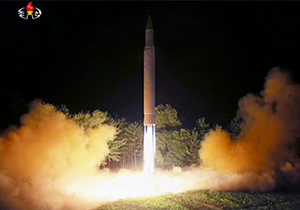
The 2017–2018 North Korea crisis was a period of heightened tension between North Korea and the United States throughout 2017. The crisis began early in 2017 when North Korea conducted a series of missile and nuclear tests that demonstrated the country's ability to launch ballistic missiles beyond its immediate region, suggesting their nuclear weapons capability was developing at a faster rate than had been assessed by U.S. intelligence. Both countries started exchanging increasingly heated rhetoric, including nuclear threats and personal attacks between the two leaders, which, compounded by a joint U.S.–South Korea military exercise undertaken in August and North Korea's sixth nuclear test in September, raised international tensions in the region and beyond and stoked fears about a possible nuclear conflict between the two nations. In addition, North Korea also threatened Australia twice with nuclear strikes throughout the year for their allegiance with the United States. International relations lecturer and former government strategist Van Jackson said in the book On the Brink: Trump, Kim, and the Threat of Nuclear War that it was the closest the world had come to nuclear war since the Cuban Missile Crisis.

The 2018 North Korea–United States Singapore Summit, commonly known as the Singapore Summit, was a summit meeting between North Korean Chairman Kim Jong Un and U.S. President Donald Trump, held at the Capella Hotel, Sentosa, Singapore, on June 12, 2018. It was the first-ever meeting between leaders of North Korea and the United States. They signed a joint statement, agreeing to security guarantees for North Korea, new peaceful relations, the denuclearization of the Korean Peninsula, recovery of soldiers' remains, and follow-up negotiations between high-level officials. Both leaders also met separately with Singaporean Prime Minister Lee Hsien Loong.

The 2021–2023 North Korean missile tests are a series of North Korean missile tests in 2021, 2022, and 2023. North Korea conducted a record number of tests in 2022, including the first test over Japanese territory since 2017.
The following is a list of events from the year 2023 in North Korea.